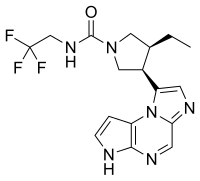
Photo from wikipedia
Abstract Objective A considerable proportion of patients with moderate-to-severe ulcerative colitis (UC) treated with advanced therapies do not achieve remission, even after 1 year of treatment, and suboptimal response to… Click to show full abstract
Abstract Objective A considerable proportion of patients with moderate-to-severe ulcerative colitis (UC) treated with advanced therapies do not achieve remission, even after 1 year of treatment, and suboptimal response to advanced therapies is frequently observed in clinical practice. This study aimed to analyze clinical practice data in the United Kingdom (UK) and assess the rates of clinical remission and inadequate response with advanced therapies among patients with UC. Methods This retrospective chart review included patients with UC who initiated a new advanced therapy (i.e. adalimumab, infliximab, golimumab, tofacitinib, or vedolizumab) between January 2017 and September 2019 from eight clinics across the UK. At least 12 months of data before and after starting an advanced therapy were required. Remission was assessed using components of the Mayo score. Inadequate response was defined by therapeutic adjustment or emergency treatment. Results Among 238 patients included (female: 46.6%; median age: 42.0 years; median follow-up: 28.8 months), 178 patients (74.8%) were biologic-naïve. At 12 months, 87 patients (53.9%) had achieved remission (median time to remission: 7.6 months), although 29 (33.3%) among them had required therapeutic modifications to achieve remission. At 12 months, 105 patients (44.3%) had at least one indicator of an inadequate response (median time to the first indicator of inadequate response: 18.0 months). Conclusions Nearly half of the patients did not achieve remission, and almost half of the included patients had an inadequate response within 1 year after treatment initiation. More effective therapies are needed to effectively treat UC. PLAIN LANGUAGE SUMMARY Treatment of ulcerative colitis (UC) follows a stepwise approach that considers disease severity and disease activity. It has the goal of achieving and maintaining steroid-free remission and healing of the gut lining. Treatment options for UC include several conventional and advanced therapies. However, suboptimal response to treatment has been reported in previous observational studies. This results in treatment adjustments, such as therapy discontinuation, dose intensification, and addition of conventional therapies, as well as lengthy concurrent use of corticosteroids. This retrospective chart review evaluated clinical practice data from eight clinics across the United Kingdom. This was done to assess rates of clinical remission and indicators of suboptimal response to advanced therapies among patients with UC. The analysis included data from January 2017 to September 2019. Nearly half of the patients did not have clinical remission within 1 year after starting advanced therapies. Optimization of advanced therapies was often seen, even in patients in remission. The most common indicators of suboptimal therapy were therapy discontinuation, dose escalation of advanced therapy, and the addition of conventional therapies. Our findings suggest that the efficacy of advanced therapies to treat UC remains insufficient in clinical practice. Thus, there is a need for more effective treatment alternatives to achieve better outcomes for patients with UC.
Journal Title: Current Medical Research and Opinion
Year Published: 2023
Link to full text (if available)
Share on Social Media: Sign Up to like & get
recommendations!